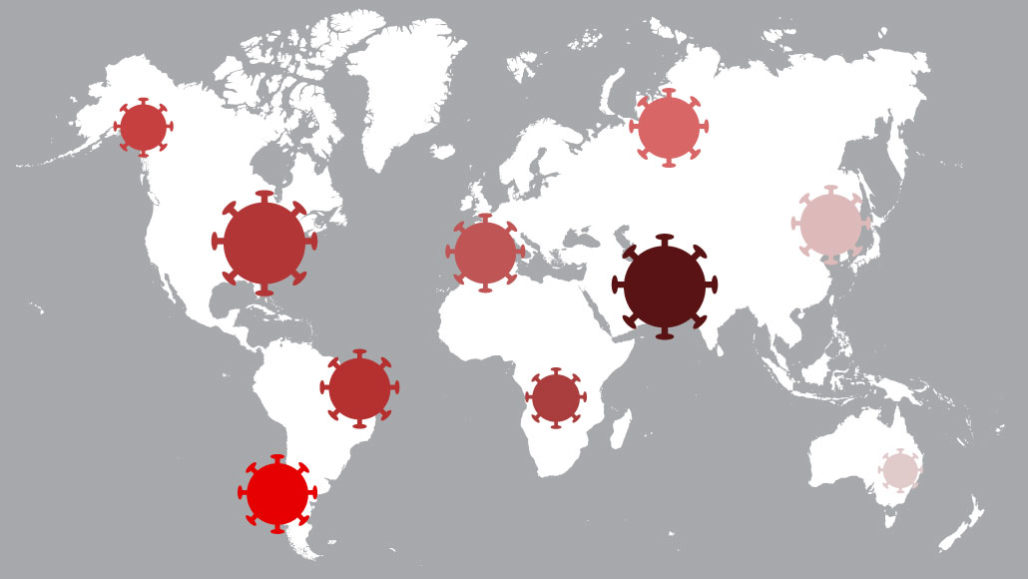Seasonal flu tends to mutate every year which is why there are annual vaccinations. However sometimes viruses can mutate in a way that helps the infection to spread.
 Is The Coronavirus Mutating Yes Here S Why You Don T Need To Panic Science News
Is The Coronavirus Mutating Yes Here S Why You Don T Need To Panic Science News
Its normal for viruses including SARS-CoV-2 to mutate.

How viruses mutate. While virologists are intensely interested in how viruses mutate and transmit between speciesand understand this process to an extentmany gaps in knowledge remain. The new coronavirus like all other viruses mutates or undergoes small changes in its genome. I talked to Bettie Steinberg.
Goodman says when viruses mutate in a way that is beneficial to its survival that mutation of the virus will multiply and spread. This is a technique that allows scientists to monitor the tiny. SARS-CoV-2 is actually one of the rare RNA viruses that has a proofreading mechanism that slows down its.
But is there a limit to. Thats because they copy themselves to reproduce. The virus replicates in a primary host like bats.
Viruses though not technically alive also mutate and evolve as they infect a hosts cells and replicate. Recently some concerning mutations have emerged. How do viruses mutate.
Mutations are found through genome processing. And mutations in viruses crop up all the time when the virus grows inside a person specifically when it reproduces and makes a bunch of copies of itself. Once inside the cell the virus has to evade the cells immune defenses and then commandeer the appropriate parts of the hosts biochemistry to churn out new viruses.
Its a type of RNA virus some of which mutate practically every time they replicate. How and why coronaviruses mutate. The resulting tweaks to the viruss genetic code.
Viruses change all the time. However most are inconsequential but the ones that originated in South Africa UK Brazil can end up having a more decisive new advantage to the novel coronavirus. More worrying mutations are when the proteins on the surface of the virus are changed so it can evade the immune.
All viruses are made up of a bundle of genetic material either DNA or RNA thats covered by a protective coating of proteins. Mutant viruses and cells with lowered mutation rates can be isolated by exposing cells or viruses to mutagens but just as there are proteins and alleles that decrease mutation rates there are mutations to break those proteins and other alleles that increase mutation rates which are beneficial in some environments. If it just so happens that those mutations help to increase their levels and make them more infectious then those are just going to get propagated.
As the cell copies that genome it sometimes makes mistakes usually just a single. L ike all viruses SARS-CoV-2 the virus that causes Covid-19 is mutating all the time. The coronavirus is mutating picking up genetic changes as the world races to vaccinate people as fast as possible.
This is especially true of viruses that contain RNA as their genetic material such as coronaviruses and influenza viruses. Viruses mutate constantly. Skilled in their craft Most.
When viruses jump to humans Usually a virus starts in a reservoir. Recently some striking evolution of the virus has been observed by scientists. A cell infected by a coronavirus releases millions of new viruses all carrying copies of the original genome.
Then when another species such as wild animals come in contact with the. Viruses spread from one animal to another through close contact in whatever manner it normally spreads such as coughing or sneezing in the case of a respiratory virus. This is a transmission electron microscope image showing the new coronavirus emerging from the.
The viruses replicate and mutate in order to survive but it also comes with tiny genetic coding errors. Think of our cells as having their own xerox machines which the virus takes over for its own purposes. When a virus makes a copy.
